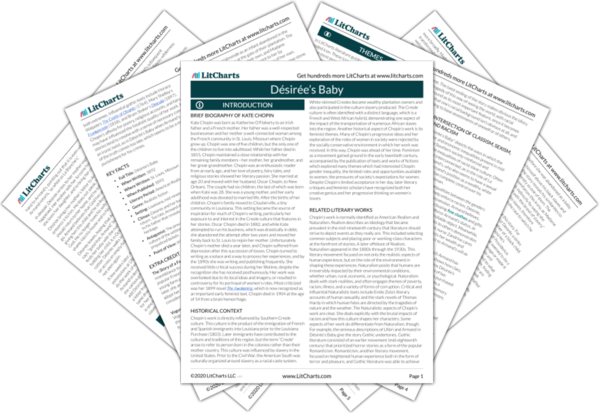Slavery and Racism
Set in Louisiana in the mid-nineteenth century on two white-owned plantations some time before the Civil War, the story explores the psychological impacts of slavery and racial inequality. The violence and physical abuse that was so much a part of slavery exist only on the fringes of the story, implied in Armand’s “strict” treatment of his slaves and his ambiguous but likely sexual relationship with La Blanche, which makes sense given that all…
read analysis of Slavery and RacismIntersection of Classism, Sexism, and Racism
“Désirée’s Baby” depicts the ways in which the gender and economic inequalities present in mid-nineteenth century Southern society reinforced and intermingled with the inequalities of racist slave culture. Often these three issues are interconnected, as in the role of La Blanche, a slave of Armand’s, who also seems to have a sexual relationship with him. Armand’s position as a wealthy, white male allowed him to exercise complete control over his possession: a poor…
read analysis of Intersection of Classism, Sexism, and RacismLove and Blindness
Love, both romantic and familial, is a powerful transformative force in “Désirée’s Baby.” Love primarily works to soften characters, allowing them to care for other individuals and for their fellow human beings more broadly. Madame and Monsieur Valmondé are transformed when they discover an abandoned child and welcome her as their own despite her mysterious and, likely, impoverished background. Armand is also softened by his love for Désirée. Not only does he wish to…
read analysis of Love and Blindness
Irony, Misjudgments, and Fate
The story ends with a twist of situational irony: Armand discovers too late that it is he (and not his wife) who has black heritage. Armand acted upon the misjudgment that Désirée, and her unknown past, were to blame for the appearance of their baby. Armand’s misjudgment reveals the prejudice that would cause him to blame his wife rather than himself. As a man, Armand sees himself as above women and is…
read analysis of Irony, Misjudgments, and Fate






